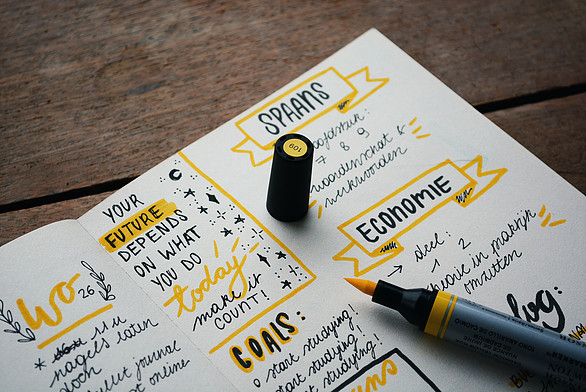Lying About the ARE Exam Could Help You Pass, Seriously

Few people outside the world of architecture can understand the scope, difficulty, and challenges posed by the ARE 5.0 exam. Tackling the licensure process and passing all six exams is a major commitment of time and money, not to mention the inevitable injury to your self-esteem along the way. You know it's a herculean task, but not many others will get it. And all those questions, smirks, and expectations only add to the pressure you and most ARE candidates feel.

The fact is, even "master test takers" fail these exams. It’s a reality for most ARE candidates. The ARE is not your typical standardized multiple-choice exam. Expecting to pass every division the first time is not realistic. Just take a look at the ARE 5.0 pass rates – something is wrong, and it's not you – a topic for another post.
The resulting anxiety can be debilitating from this undue pressure. But, for many candidates, their anxiety isn’t about atychiphobia (fear of failure). It’s about having to explain a failed exam to friends and family who don’t get it. Ugh. Sound familiar? There is one way to avoid these awkward conversations. Lie!
Announcing your goals publicly can be counterproductive, whether it’s weight loss, hiking the Appalachian Trail, or taking the ARE. The people you tell start to think of you as an architect, so the announcement itself feels like a small achievement toward that goal (an empty achievement). Then, if you fail, dealing with the fallout can be soul crushing and create a negative feedback loop.
Don’t tell people when you’re testing. Keep your test dates and study schedule to yourself. Nobody has to know. Let’s practice.
Them: “Hey, what are you doing after work?”
You: “I’m, uhh, meeting my cousin… from out of town.”
You, actually: Studying with CLARE ARE exam prep.
Them: “You have plans this weekend?”
You: “Yeah, I’m going, ummm, hiking, on Saturday.”
You, actually: Going to the PSI testing center.
See? It’s simple.
Now, if you fail an exam (at some point you most likely will), there’s nobody to answer to but yourself. Of course, there’s still the time, money, and self-esteem issues to deal with, but at least you won’t have to see the disappointed look on grandma’s face, or hear your friend say, “But didn’t you go to school for that?”
Lying about the ARE 5.0 is not a cure for anxiety. You’ll have to work that out with your therapist. It’s a strategy; a way for anxious candidates to minimize external pressures while navigating the inevitable pitfalls of the ARE. It’s self-preservation. Getting a FAIL is part of the process. Only quitting is failing.
Get back at it. We'll keep your secret and help you pass the next time with CLARE.
New Resolutions + New Habits = Transform Your Life.

How to Create an ARE Study Habit that Sticks.
It’s January, you’ve made your “get architecture license” new year’s resolution, and purchased some ARE 5.0 study materials. But have you taken any real steps toward achieving your goal?
Shopping is easy and purchasing stuff we think we need to start working towards our goal feels good. People join a gym, buy workout clothes, or stock their fridge with healthy foods. But that won’t get you to the gym 3 times a week, or force you to eat avocado toast. And the study materials you bought...they’re still waiting for you to use them. By March 54% of resolvers have lost motivation and are trying to forget they even made any resolutions. But there is hope.
Upon digging into the research I found that the often-cited statistic that just 8% of people actually achieve their resolutions is incorrect. A few copying errors and incorrect sources cited spread the misinformation all over the internet. But I digress. The good news is that 46% of self-reported resolvers were still successful at the six-month mark. How do they do it? Do they have some genetic advantage or a highly classified secret? I don’t think so. But, I wager they’re creatures with good habits.
A simple resolution to get your architecture license or start taking the ARE isn’t enough. Setting an ambitious goal that is overwhelming and vague isn’t going to cut it. It lacks specificity and isn’t measurable. Like any design project, your resolution requires a plan, delivery system, schedule, and milestones in order to achieve it. This is the first and most crucial step, and it requires some pretty tuff work. You need to be willing to change your behavior, break bad habits, and form new ones to create study habits that stick. It’s definitely not easy. It takes effort and time, something most of us barely have enough of. If you skip this step, you’ll struggle to achieve your goal, and it’s probably the reason why you have failed in the past.
The Power of Habits
To create a realistic plan and form good habits that stick, it’s necessary to understand the power of habits and the decisive role they play in your success or failure. If you’d like to consistently devote time to study, you have to change how you currently spend your time. You must quantify how much time you’re losing to bad habits and transform them into habits that will help you achieve your goal.
Take a hard look at your current routine, schedule, and time-sucking bad habits to figure out how you can reallocate your time. How much time do you spend binge-watching Netflix? You don’t have to give it up entirely just cut back a little. Can you wake up 30 minutes earlier? Are you an iPhone addict, social media or news junkie? Check your screen time – if you dare. Finding 30 minutes a day will give you close to 4 hours of study time per week.
The total amount of time reclaimed will be the time you can dedicate to studying. If you only have an hour, use it. The fact is after 25-30 minutes of studying, our ability to retain information starts to diminish. Long study sessions are not particularly efficient. A shorter duration of deep focus can be more productive and if repeated often will quickly start to add up. Remember, your initial goal is to form a study habit that sticks, which is the key to reaching your ultimate goal of having your architecture license.
Once you’ve determined how much time you can realistically allocate, you need to plan out where and when you’ll study. You may decide to spend 1 hour 3 times per week, at the coffee house near your office, or 30 minutes each morning, or a combination of both. Whatever the plan, include it in your schedule and write it out. For example, during the week, I will [ insert activity and length of time here] at [location] on [time and day(s) of the week].
To establish this new study habit and set yourself up for success you need to establish milestones and build a reward system into your new routine. Initially, you can set smaller milestones at daily and weekly intervals. The rewards you choose should be something you will look forward to and should be reserved solely for this purpose. This reward system is known as a habit loop that will help you build momentum and solidify a habit. As you achieve the initial goal of sticking to a study habit, you’ll feel a sense of accomplishment, which will quickly replace the need for a material reward as your brain interprets the habit as the reward.
There’s a lot of research about habits and great reads to help you make the changes necessary to achieve your goals, including licensure. Once you understand the transformative power of habits and how they work, you will have the power to transform your life.
Get your architecture license by starting to prepare for the ARE 5.0 today.
Best Practices for the ARE 5.0 – Study Habits

How to Build Effective Study Habits for the ARE 5.0
Life gets busy with family obligations and work responsibilities. It's natural to get distracted when pulled in many directions. Establishing good ARE 5.0 study habits is crucial to navigating these challenges effectively.
Procrastination is the bad habit of putting off until the day after tomorrow what should have been done the day before yesterday. - Napoleon Hill
Understanding the Best Way to Study for ARE 5.0
There is no one-size-fits-all solution to studying for the ARE 5.0. We all have diverse lives and learn differently, but one thing that applies to all candidates is the importance of good habits.
We first make our habits, and then our habits make us. - John Dryden
The Importance of Good Habits
Good habits are best practices we can adopt for ourselves. They require effort, consideration, discipline, and time. Recognize what is important to you, prioritize, and hold yourself accountable. This is your ARE journey, not to be compared with anyone else's. Comparisons only distract and cause anxiety, inhibiting your ability to focus. Reading about people passing all six ARE 5.0 exams on their first try in three months can be discouraging. Even though you know that such an achievement is rare and not a goal you should focus on, it can still affect your motivation. Good habits need self-reflection, impartial feedback, clarity, and commitment. They demand regular maintenance until they become a part of who you are.
Self-reflection allows you to identify areas for improvement, set realistic goals, track progress, enhance self-awareness, ensure alignment with values, and promote accountability. Impartial feedback offers objective insights, identifies blind spots, measures progress accurately, improves accountability, helps adjust strategies, enhances motivation, and builds trust and support. Clarity provides direction and focus, while commitment ensures perseverance and resilience in maintaining these habits.
Creativity is a habit, and the best creativity is the result of good work habits. - Twyla Tharp
Creating a Sustainable Study Routine
Set realistic goals to create good habits and a sustainable routine. Start small and be creative. Evaluate how you spend your day and identify time-sucking habits you can reduce or eliminate. Replace them with productive habits. Small changes, like freeing up ten minutes daily, can make a difference. Use that time for bite-sized studying with the right materials and a streamlined learning process.
Establishing a Study Habit
Establishing a study habit is key to success on the ARE 5.0 exam. Determine the best time and place for you to study, whether it's in complete silence or with background noise. Maybe you can study for an hour three times a week at a coffee shop during your lunch break or wake up early to study for 30 minutes before work. Make a realistic, well-organized study schedule and stick to it.
It's not about how many hours you study in one session. Your mind can only focus effectively for about 45 minutes at a time. The quality and consistency of your study sessions are what truly matter. Regular, shorter periods of focused study are more productive than long, exhausting marathons.
Blocking out hours of study time can be overwhelming. Instead, carve out 30-minute sessions and create a pattern that becomes routine. Studies show that shorter durations of deep focus and repetition are more productive for long-term retention. With CLARE, you can study effectively in short bursts or longer, in-depth sessions tailored to your schedule. You can schedule weekly, bi-weekly, or monthly one-on-one meetings to help you with ARE content and strategies while providing continuity, accountability, and routine needed for success.
I began to realize how simple life could be if one had a regular routine to follow with fixed hours, a fixed salary, and very little original thinking to do. - Roald Dahl
Maintaining a Routine
Maintaining a routine is the best way to instill a habit. Setting a regular study schedule helps you build consistency and makes studying a natural part of your day. Determine the best time and place to study and stick to it. Consistency is key, whether an hour three days a week at a coffee shop or 30 minutes before work. Regular maintenance of your study routine ensures that good habits become ingrained and automatic.
Routines free your mind from the chaos of daily life, allowing you to focus on essential tasks like passing the ARE 5.0. Having a set time and place for studying minimizes decision fatigue and creates an environment conducive to learning. This predictability reduces stress and increases productivity, as you know exactly when and where to focus your efforts.
However, don't beat yourself up if something comes up that requires you to get off schedule. Life is unpredictable, and flexibility is important. Just get back on track as soon as possible and continue your routine.
Our goals can only be reached through a vehicle of a plan, in which we must fervently believe, and upon which we must vigorously act. There is no other route to success. - Pablo Picasso
Building a Reward System
Incorporate a reward system into your routine to cultivate good habits. Rewards don't have to be big or materialistic; they can be simple, like checking off tasks on your to-do list. Each target you hit, and milestone you achieve will boost your motivation.
We can do anything we want to if we stick to it long enough. -Helen Keller
Conclusion
Get started and stick with it. Slow and steady wins the race. You will pass the ARE and become a licensed architect.